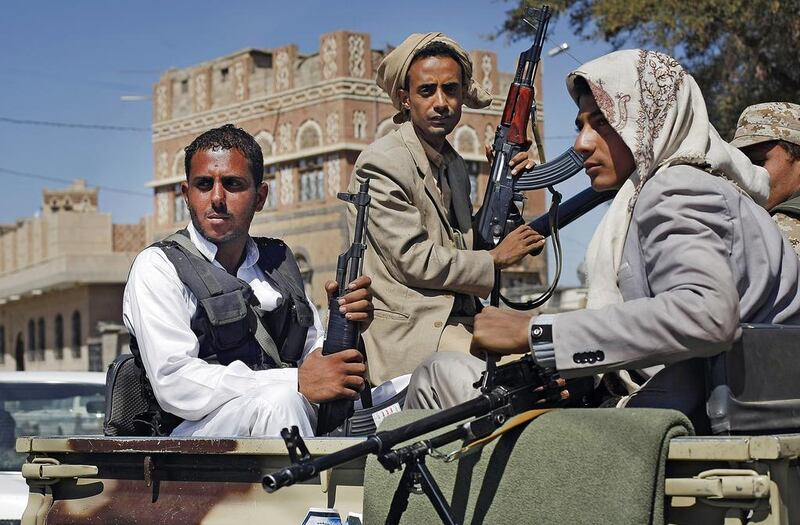On Wednesday, Iranian Brigadier General Masoud Jazayeri dropped a figurative bombshell regarding the conflict in Yemen. The deputy chief of staff of the armed forces said Tehran was willing to help Houthi rebels “in any way it can, and to any level necessary” against the Saudi-led coalition. Gen Jazayeri drew parallels to his country's intervention in Syria, where Iran has sent troops and advisers.
The timing of the announcement is as important as its content, coinciding with a visit to Saudi Arabia by a Houthi delegation – the first of its kind since Riyadh and its allies launched Operation Decisive Storm in Yemen a year ago.
The talks resulted in a prisoner exchange, a welcome of a “state of calm” along the border, and Saudi foreign minister Adel Al Jubeir expressing his country's commitment to a political solution to the war under UN-backed peace efforts.
Gen Jazayeri's statement may have been intended to give the Houthis leverage in their talks in Riyadh by raising the spectre of large-scale, direct Iranian involvement in Saudi Arabia's southern neighbour if the negotiations did not go the Houthis' way. Or Tehran may have wanted to scupper the talks altogether, and the confidence-building measures that resulted from them, by angering the Saudis and emboldening the Houthis.
Iran's “duty” to get involved, as Gen Jazayeri put it, may be spurred by the steady progress being made on the ground by Saudi-backed Yemeni and coalition forces, as well as speculation over an impending ground offensive in the north of the country, which includes the Houthi heartlands.
Reports that ousted Yemeni president Ali Abdullah Saleh is in hospital and seeking to negotiate his exit from the country will, if true, be a major concern for his Houthi allies, as his forces were instrumental in their initial takeover of much of the country – including the capital – and the subsequent fight against the Saudi-led coalition.
While members of Saleh's General People's Congress (GPC) party deny that he intends to flee Yemen, one of them did acknowledge last week that “he certainly has heart problems”.
Whatever Tehran's motives, Gen Jazayeri's statement has backfired publicly and spectacularly. In an unprecedented rebuke, senior Houthi official Yousef Al Feshi – who is seen as close to the Houthis' overall leader Abdel Malek Al Houthi – responded on Facebook that “Iran must be silent and leave aside the exploitation of the Yemen file”.
As yet, Mr Feshi has not retracted his statement, nor has the Houthi leadership distanced itself from him for it, suggesting that he was not speaking out of turn or simply in a personal capacity. This is an important acknowledgement from a group with which Iran at least sympathises, if not materially supports, that Tehran's direct involvement would be for its own self-interest, rather than that of the Houthis or of Yemen.
It may also be a calculation by the group that this would not only greatly aggravate and prolong the conflict, but also isolate it domestically and increase perceptions of it as an Iranian proxy.
In any case, Brig Gen Jazayeri's statement is likely to be mere posturing, because it is difficult to imagine Tehran thinking it could actually pull it off, particularly since it would supposedly be acting in the service of a party that does not want such “help”.
Getting directly involved in Yemen would be far more difficult than in Syria, to which Iran has easy access by land and air. The Saudi-led coalition has imposed a strict blockade, so even if Iranian forces managed to get through – a big if – it would certainly not be in sufficient numbers to make a difference on the ground.
Tehran could also face the humiliation of its forces being intercepted and detained en route, or even killed if a stand-off became violent.
Those who did make it into Yemen would be operating in unfamiliar terrain, and would potentially be easy pickings for coalition forces, which enjoy air supremacy – unlike in Syria, where it is Saudi-backed rebels who have no air cover against the regime and its allies.
Furthermore, in Syria, Iranian forces can count on the support of powerful forces from neighbouring Lebanon and Iraq, as well as Russian air strikes. None of the states surrounding Yemen oppose the Saudi-led coalition, and while Moscow has been critical of the coalition campaign, there is no prospect of direct Russian intervention.
Riyadh and its allies – and probably Tehran also – are well aware of the limitations of Iranian involvement in Yemen. As such, some Saudi commentators are openly taunting Tehran to put its money where its mouth is, so to speak, confident that it would be given a bloody nose in Saudi Arabia's own backyard.
Sharif Nashashibi is a journalist and analyst on Arab affairs





